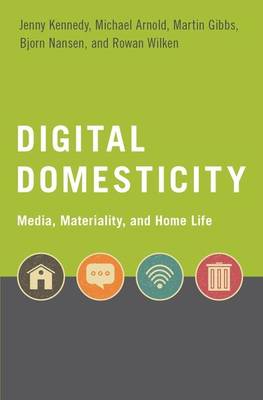
- Afhalen na 1 uur in een winkel met voorraad
- Gratis thuislevering in België vanaf € 30
- Ruim aanbod met 7 miljoen producten
- Afhalen na 1 uur in een winkel met voorraad
- Gratis thuislevering in België vanaf € 30
- Ruim aanbod met 7 miljoen producten
Zoeken
Digital Domesticity
Media, Materiality, and Home Life
Jenny Kennedy, Michael Arnold, Martin Gibbs, Bjorn Nansen, Rowan Wilken
Paperback | Engels
€ 82,45
+ 164 punten
Omschrijving
At the turn of the twenty-first century, typical households were equipped with a landline telephone, a desktop computer connected to a dial-up modem, and a shared television set. Television, radio and newspapers were the dominant mass media. Today, homes are now network hubs for all manner of digital technologies, from mobile devices littering lounge rooms to Bluetooth toothbrushes in bathrooms--and tomorrow, these too will be replaced with objects once inconceivable.
Tracing the origins of these digital developments, Jenny Kennedy, Michael Arnold, Martin Gibbs, Bjorn Nansen, and Rowan Wilken advance media domestication research through an ecology-based approach to the abundance and materiality of media in the home. The book locates digital domesticity through phases of adoption and dwelling, to management and housekeeping, to obsolescence and disposal. The authors synthesize household interviews, technology tours, remote data collection via mobile applications, and more to offer readers groundbreaking insight into domestic media consumption. Chapters use original case studies to empirically trace the adoption, use, and disposal of technology by individuals and families within their homes. The book unearths social and material accounts of media technologies, offering insight into family negotiations regarding technology usage in such a way that puts technology in the context of recent developments of digital infrastructure, devices, and software--all of which are now woven into the domestic fabric of the modern household.
Tracing the origins of these digital developments, Jenny Kennedy, Michael Arnold, Martin Gibbs, Bjorn Nansen, and Rowan Wilken advance media domestication research through an ecology-based approach to the abundance and materiality of media in the home. The book locates digital domesticity through phases of adoption and dwelling, to management and housekeeping, to obsolescence and disposal. The authors synthesize household interviews, technology tours, remote data collection via mobile applications, and more to offer readers groundbreaking insight into domestic media consumption. Chapters use original case studies to empirically trace the adoption, use, and disposal of technology by individuals and families within their homes. The book unearths social and material accounts of media technologies, offering insight into family negotiations regarding technology usage in such a way that puts technology in the context of recent developments of digital infrastructure, devices, and software--all of which are now woven into the domestic fabric of the modern household.
Specificaties
Betrokkenen
- Auteur(s):
- Uitgeverij:
Inhoud
- Aantal bladzijden:
- 328
- Taal:
- Engels
Eigenschappen
- Productcode (EAN):
- 9780190905798
- Verschijningsdatum:
- 1/06/2020
- Uitvoering:
- Paperback
- Formaat:
- Trade paperback (VS)
- Afmetingen:
- 135 mm x 206 mm
- Gewicht:
- 385 g

Alleen bij Standaard Boekhandel
+ 164 punten op je klantenkaart van Standaard Boekhandel
Beoordelingen
We publiceren alleen reviews die voldoen aan de voorwaarden voor reviews. Bekijk onze voorwaarden voor reviews.











